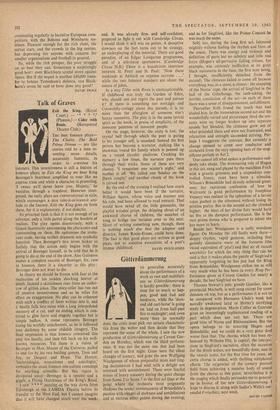Talk of Graves
Exit the King. (Royal Court.) — ' * * * * (Phoenix.) — Cider with
Rosie. (Hampstead Theatre Club.)
Tim best Ionesco plays— The Chairs, The Bald Prima Donna — are like stories told by a man in- venting more details, accurately fantastic, in order to convince his listeners. This inventiveness is still a feature of lonesco plays; in Exit the King we hear King Berenger's heartbeat amplified to roar like an express train and while a character is protesting, 'I swear we'll never leave you, Majesty,' he vanishes through a trapdoor. However inter- preted, the early plays are conversational in style, which encourages a nice take-it-or-leave-it atti- tude to the fantasy. Exit the King goes on from there, for it is explanatory, if not didactic.
Its principal fault is that it is not enough of an advance; only a little patrol along the borders of realism. The play opens disastrously, with a Guard facetiously announcing the characters and commenting on them. He epitomises the irrele- vant aside, having neither dramatic nor symbolic function. Then Berenger's two wives bicker so futilely that the action only begins with the arrival of Berenger himself, to be told that he is going to die at the end of the show. Alec Guinness makes a complete success of Berenger, for, rare in Ionesco, there is a sincerity in this play: Berenger does not want to die.
In theory we should be frozen with fear at the realisation of his sudden shocking horror at death. Instead a skittishness rises from an under- tow of girlish jokes. The story-teller has run out of creative inventiveness and so he relies for effect on exaggeration. No play can be coherent with such a conflict of form written into it, and it finally falls into ruins with a long interpolated memory of a cat, and an ending which is con- trived to glue farce and tragedy together but is simple bathos. A mime represents Berenger losing his worldly attachments, as he is followed into darkness by some childish imagery. The final impression is that Ionesco conceived this play too hastily, and then fell back on his well- known resources. Yet there is a vision of Berenger as Man, Master of the Universe, pulled to and fro by his two battling queens, Time and Joy, or Despair and Hope. The Doctor, 'bacteriologist, executioner and astrologist,' embodies the usual Ionesco one-culture contempt for anything scientific. But this vision is dissipated away—Berenger is a spectre and a giggle, a Flying Dutchman of the King's Road.
I saw .* * * *' pausing on the way down from Edinburgh at the LAMDA Theatre before its transfer to the West End, but I cannot imagine that it will have changed much over the week- end. It was already firm and self-confident, prepared to fight it out with Cambridge Circus.
I would think it will win on points. A deceptive slowness on the feet turns out to be strategy, an underplaying of the material. There are good
parodies, of an Edgar Lustgarten programme, and of a television sportsnews. (Cambridge Circus N.B.) There is a boardroom interview between St. Peter and St. Paul: 'Now those weekends at Antioch on expense account . . while the two funniest numbers are about the nature of jokes.
In a way Cider with Rosie is unexceptionable. If childhood was truly the Garden of Eden,
why should one not regret the past and pursue it? If there is something too nostalgic and Cotswoldly-cottagy about this pursuit, it is no more than the afterglow of someone else's happy memories. The play is in the same lyrical spirit as the book, in praise of simplicity, of the innocent pastimes of innocent people.
On the stage, however, the unity is lost; the crystal. ball through which the poet is gazing to his younger self, is smashed. Instead the first person has become a narrator, stalking like a showman round his family which is penned up on a raised circular platform. Cracking his memory a few times, the narrator puts them through their tricks. Some of these are very clumsy. 'I remember one winter's night,' and mother is off. 'We called one Sunday on the Davis couple,' and another chunk of the book is carved out.
By the end of the evening I realised how much better it would have been if the narrator, William Squire, whose voice and manner suit his role, had been allowed to read extracts. That would have saved all the little gimmicks, the playful wooden props, the skipping about of an awkward chorus of children, the snatches of song to bridge one incident over to the next. .Short of writing something new, though, there is nothing much else that the adaptor and director, James Roose-Evans, could have done. The fact is that good plays are written as good plays, not as sensitive evocations of a poet's






































 Previous page
Previous page